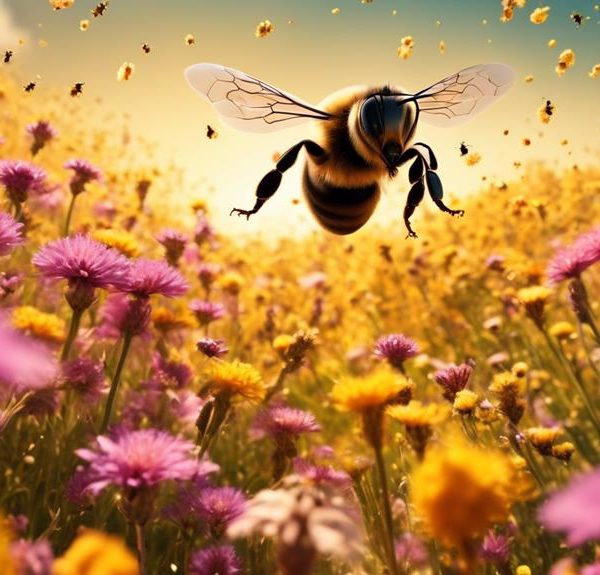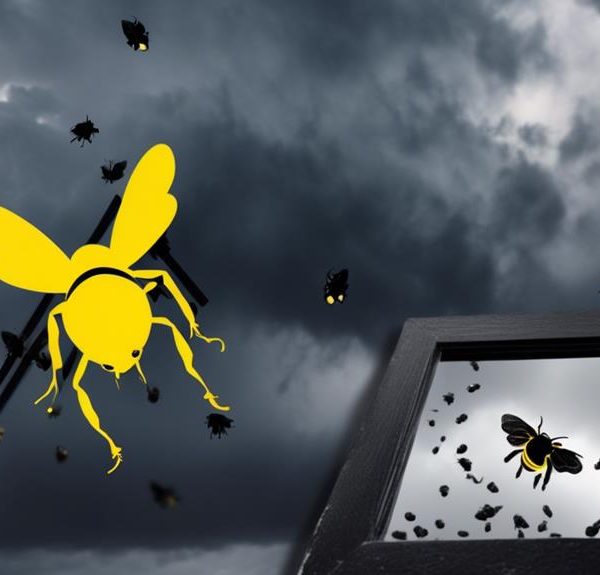Journey into the intriguing world of bees and wasps' superhuman olfactory abilities and discover if they can smell fear in humans.
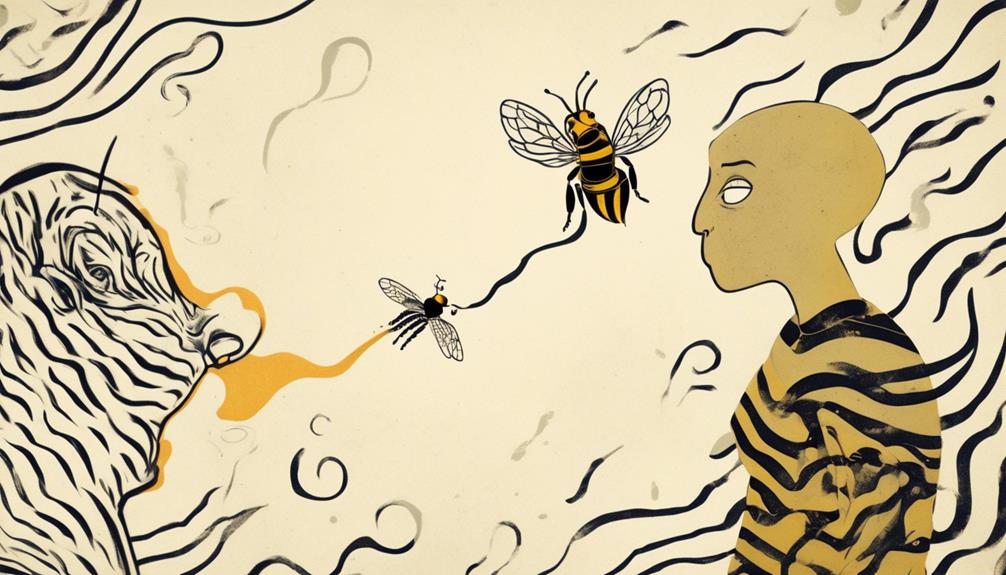
Can Bees and Wasps Smell Fear?
You've likely never considered that bees and wasps have an incredibly acute sense of smell, far surpassing our own. They can detect the faintest of odors, often from great distances, but does this powerful olfactory ability extend to detecting fear in humans?
This intriguing question isn't as clear-cut as you might think, and it's one that has produced a variety of theories and sparked much debate. Let's embark on a journey, then, into the fascinating world of insect senses, and uncover whether your fear could indeed be an unexpected signal to these buzzing creatures.
Key Takeaways
- Bees and wasps have a highly acute sense of smell and can detect faint odors from great distances.
- Their sense of smell is more advanced than human perception, and they use chemoreception to interpret chemical signals.
- There is no scientific evidence that bees or wasps can smell human fear, as fear is an emotional response, not a scent.
- Bees and wasps primarily detect pheromones and environmental odors, and they can detect certain chemicals in human sweat, but it's not fear they're responding to.
Understanding Bee and Wasp Senses
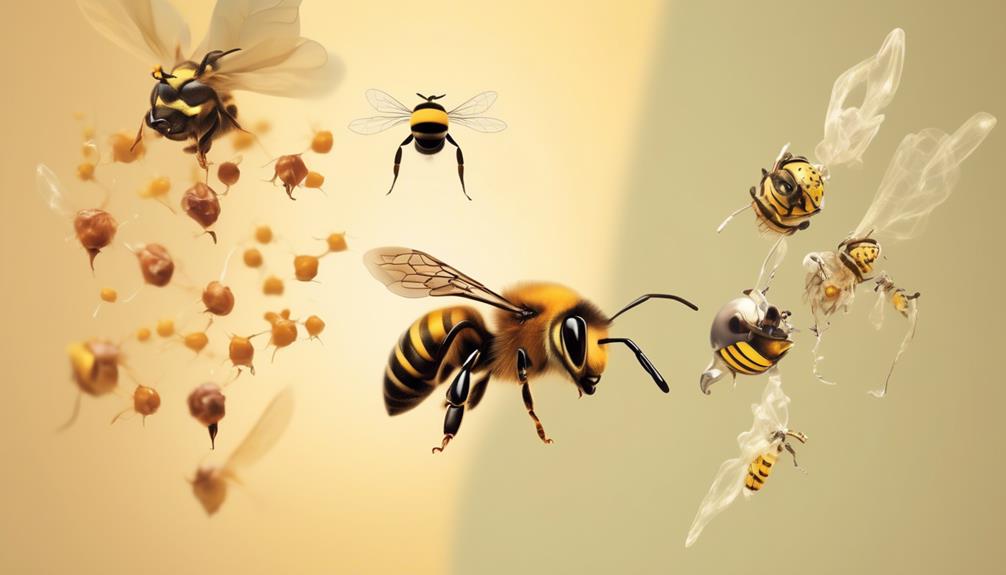
In understanding the complexities of bee and wasp senses, you'll discover a sophisticated system that surpasses basic human perception, capable of detecting a wide range of environmental cues. This advanced system, known as chemoreception, allows them to interpret various chemical signals, including pheromones and plant volatiles, thus enabling them to navigate, locate food, recognize kin, and respond to threats.
Bees and wasps possess an organ called the antennae, equipped with sensory receptors that function as their nose and fingers. These sensors pick up tiny concentrations of airborne molecules, which are then translated into signals understood by their brain. It's through this process that bees and wasps can perceive smells, tastes, and even the direction of the wind.
Moreover, bees' compound eyes can detect polarized light, a feature invisible to the human eye. This ability guides them back to their hive by reading the Sun's position even on cloudy days. Similarly, wasps have a specialized structure, the ocelli, which senses light intensity and assists in maintaining flight stability.
In essence, bees and wasps exhibit an intricate sensory system, finely-tuned to their ecological needs, granting them exceptional perceptual capabilities.
The Science of Fear Detection
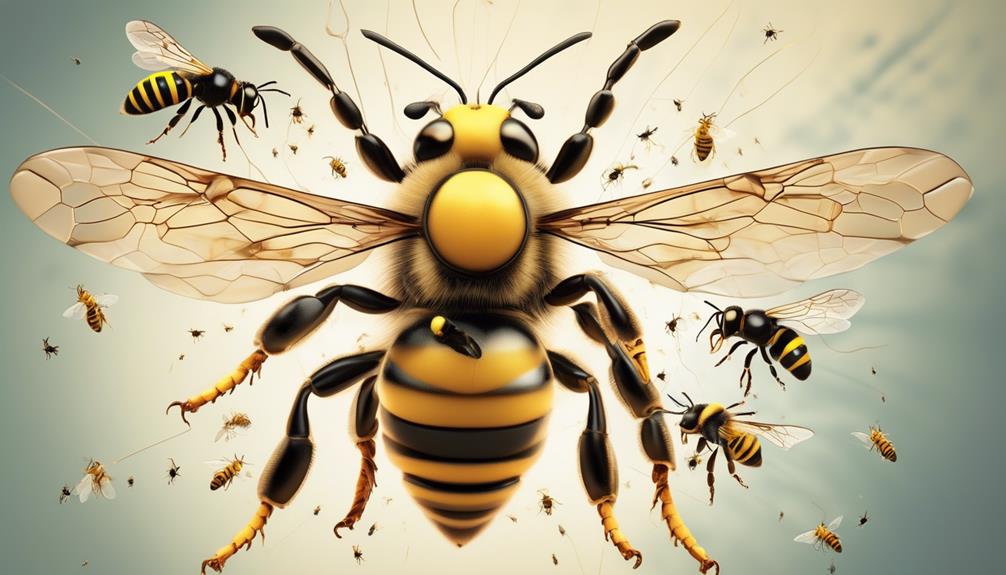
Building on this understanding of their sophisticated senses, let's explore the scientific possibility of bees and wasps detecting fear. You see, fear detection in insects isn't as straightforward as it might appear. It's more than just picking up on pheromones emitted by humans in a state of fear.
In fact, the science of fear detection encompasses a variety of physical and chemical cues that insects may be attuned to. When you're scared, your body undergoes several changes. You perspire more, your heart rate quickens, and your body releases stress hormones such as adrenaline. These physical changes, in turn, can lead to changes in your odor.
Insects, like bees and wasps, have incredibly acute olfactory systems. Their antennae serve as powerful chemical sensors, capable of detecting even minute changes in the environment. So, theoretically, it's possible that these insects could pick up on the odor changes associated with fear.
However, before you start worrying about bees and wasps sensing your fear, remember this is purely speculative. There's still much we don't know about insect olfactory detection and more research is needed to fully understand this intriguing phenomenon.
Debunking Fear Smelling Myths
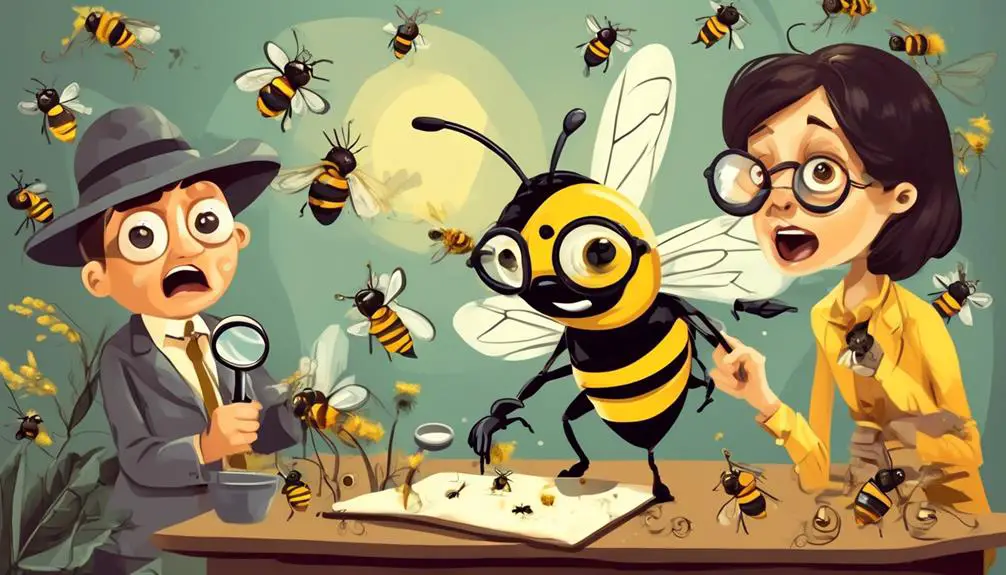
Despite popular myths, there's no concrete scientific evidence to suggest that bees or wasps can actually smell human fear. It's crucial that you understand this: fear is an emotional response, not a scent. Bees and wasps use their antennae for smell, but they're primarily attuned to pheromones and environmental odors, not complex human emotions.
Insects like bees and wasps can detect certain chemicals in human sweat, but again, this isn't fear. They're picking up on general body odors. Some people believe they're being targeted because they're afraid, but that's likely due to movement. Rapid, erratic movements can attract these insects. It's not fear they're responding to but the potential threat you represent.
How Insects Respond to Fear
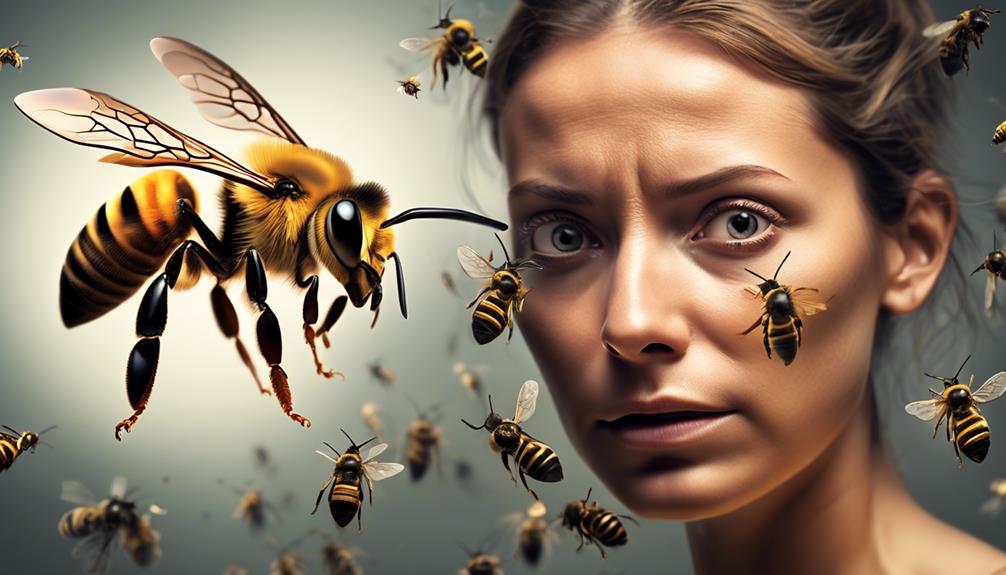
Though bees and wasps can't detect your fear, your reactions to it can significantly influence their behavior towards you. When you're frightened, your body releases chemicals, including adrenaline. This doesn't equate to 'smelling fear', but these insects are highly sensitive to quick movements and vibrations, often interpreting them as threats.
When you swat, flail, or make sudden movements, wasps and bees see this as a provocation. In response, they may become defensive and sting. However, it's not because they 'smell fear' but rather because they perceive a threat to their hive or themselves.
Conversely, if you remain calm and still, bees and wasps are less likely to view you as a threat. They may even land on you out of curiosity or mistaking you for a flower, but will typically fly away without stinging.
In essence, your reaction to fear can dictate how these insects respond to your presence. Understanding this can help you approach or avoid these insects in a way that minimizes potential harm. So, while it's not accurate to say bees and wasps can smell fear, they do react to the physiological signs of it.
The Truth About Fear and Insects
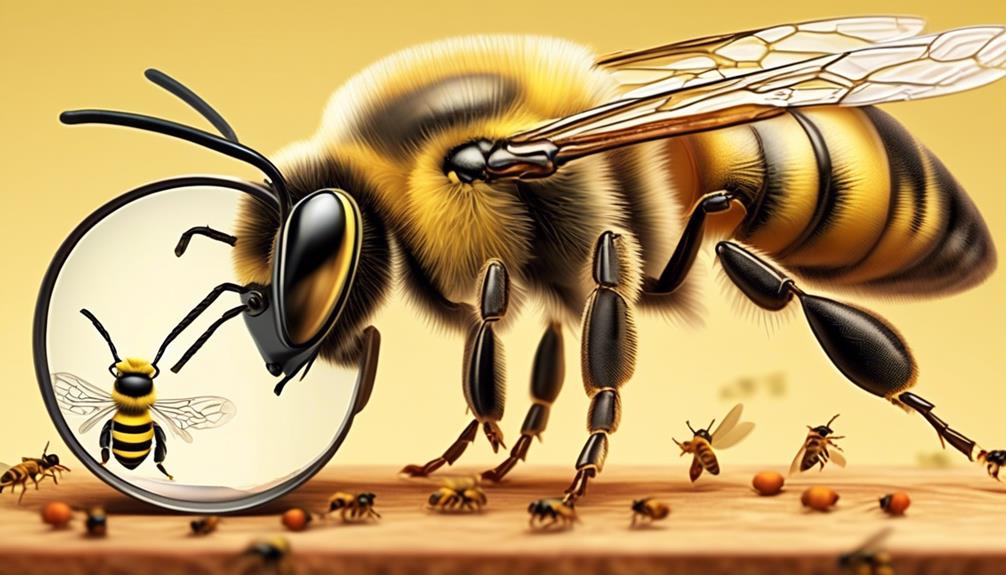
In exploring the relationship between fear and insects, it's crucial to debunk the common misconception that creatures like bees and wasps can literally 'smell' human fear. Scientifically, this isn't possible. Insects don't have noses or the olfactory system necessary to detect human emotions via airborne chemicals. They don't perceive fear in the same way you do.
Yet, insects do pick up on cues from their environment, and this can include responses to human fear. When you're frightened, your body releases stress hormones, your heart rate increases, and you may start to sweat. These physiological changes can alter your scent, but it's not the 'smell of fear' that insects are responding to. Instead, they're reacting to the change in your natural odor caused by these bodily reactions.
Insects like bees and wasps are attracted to certain chemicals in human sweat. They can detect these changes and may become more aggressive or defensive. So, while it's not accurate to say that bees and wasps can smell fear, it's true that your fear-induced reactions can affect their behavior towards you. Understanding this distinction is key in navigating and mitigating potentially harmful interactions with these insects.
Frequently Asked Questions
What Is the Lifespan of Bees and Wasps?
You're curious about the lifespan of bees and wasps, aren't you? Well, it varies by species.
Worker honeybees typically live 5-6 weeks in the summer, but queens can live up to 5 years.
As for wasps, workers live around 12-22 days, and queens can survive up to a year.
It's fascinating, isn't it? The lifespans greatly differ, yet both bees and wasps play crucial roles in our ecosystems.
How Can One Safely Remove a Bee or Wasp Nest From Their Property?
You can't just knock down a bee or wasp nest. It's risky and potentially harmful. You should call a professional pest control service. They're equipped with the right tools and protective gear. If you're allergic, don't even think about doing it yourself.
Always remember, safety first. Bees and wasps play an important role in our ecosystem, so humane removal is the best approach. Leave it to the pros and keep yourself and these creatures safe.
Is There a Certain Type of Bee or Wasp That Is More Likely to Attack When Sensing Fear?
There's no specific type of bee or wasp that's more likely to attack when sensing fear. These insects aren't capable of smelling fear. They respond to physical threats. If you're around them and act erratically, they may perceive this as a threat and react defensively.
Therefore, it's not fear they're picking up on, but your actions. It's always best to remain calm and still if a bee or wasp is nearby.
What Are the Main Differences Between Bees and Wasps?
You're asking about the main differences between bees and wasps.
Well, bees are generally more robust and hairy, aiding in pollen collection. They mostly eat nectar and pollen.
Wasps, on the other hand, have slender, smooth bodies and can be predators or parasites. Their diet varies but can include other insects.
Bees typically live in large colonies while wasps might live solitarily or in smaller groups.
What Are Other Common Misconceptions About Bees and Wasps?
You might've heard that bees and wasps can recognize human faces or that they're attracted to certain colors. Both are misconceptions. While these insects have advanced visual systems, they don't recognize human faces.
Similarly, they're not necessarily drawn to specific colors, but more to the patterns and movements that suggest potential food sources.
It's crucial to understand these facts to coexist peacefully with these vital creatures.
Conclusion
So, can bees and wasps smell fear? The answer's no. Despite common myths, there's no scientific evidence indicating they can detect human emotions through smell.
Instead, these insects respond to physical cues. Bees and wasps react to sudden movements or vibrations, which might be mistaken for fear detection.
Always remember, understanding their senses and behaviors is key to coexisting peacefully. So, don't let fear guide your interactions – they're not smelling it, they're simply responding to your actions.

